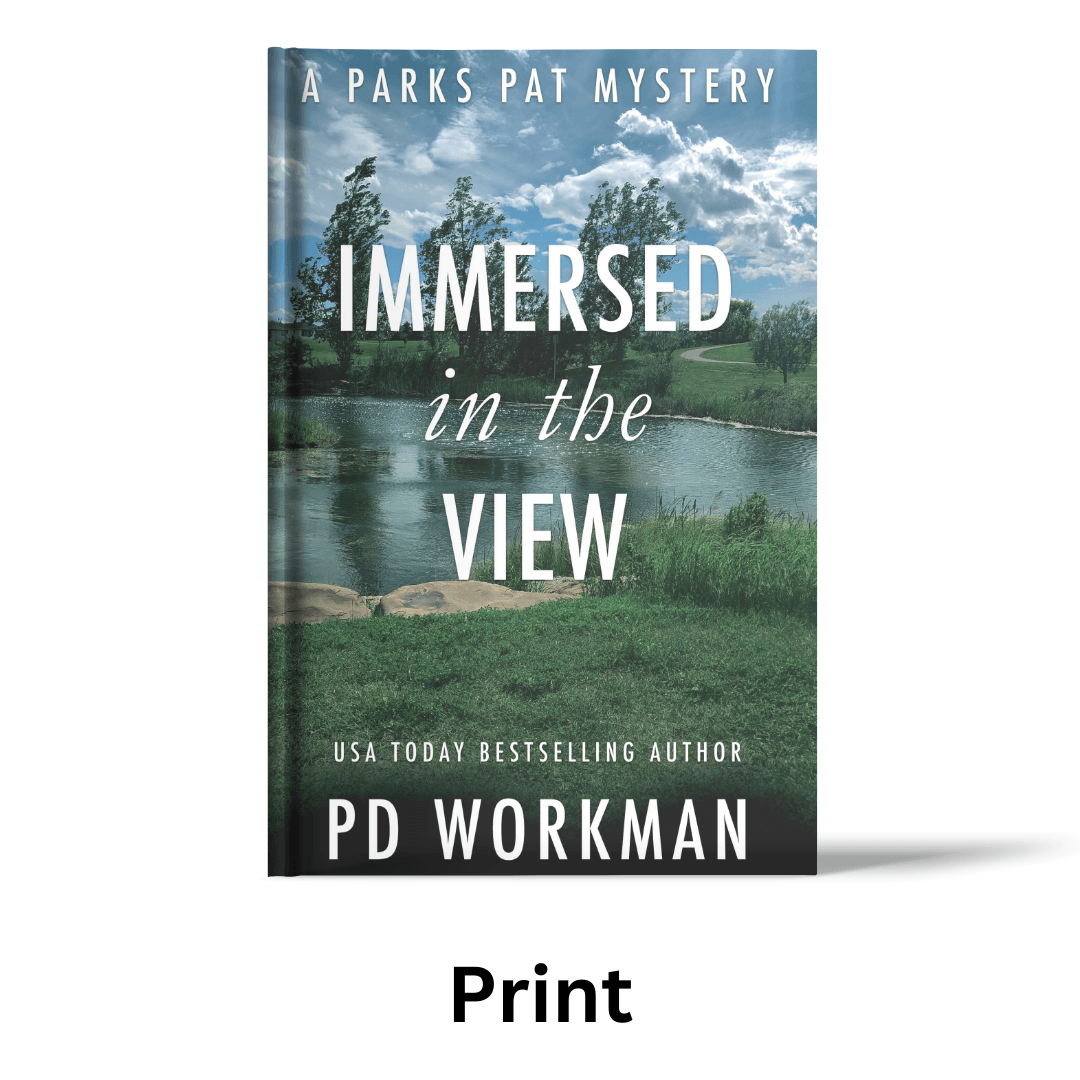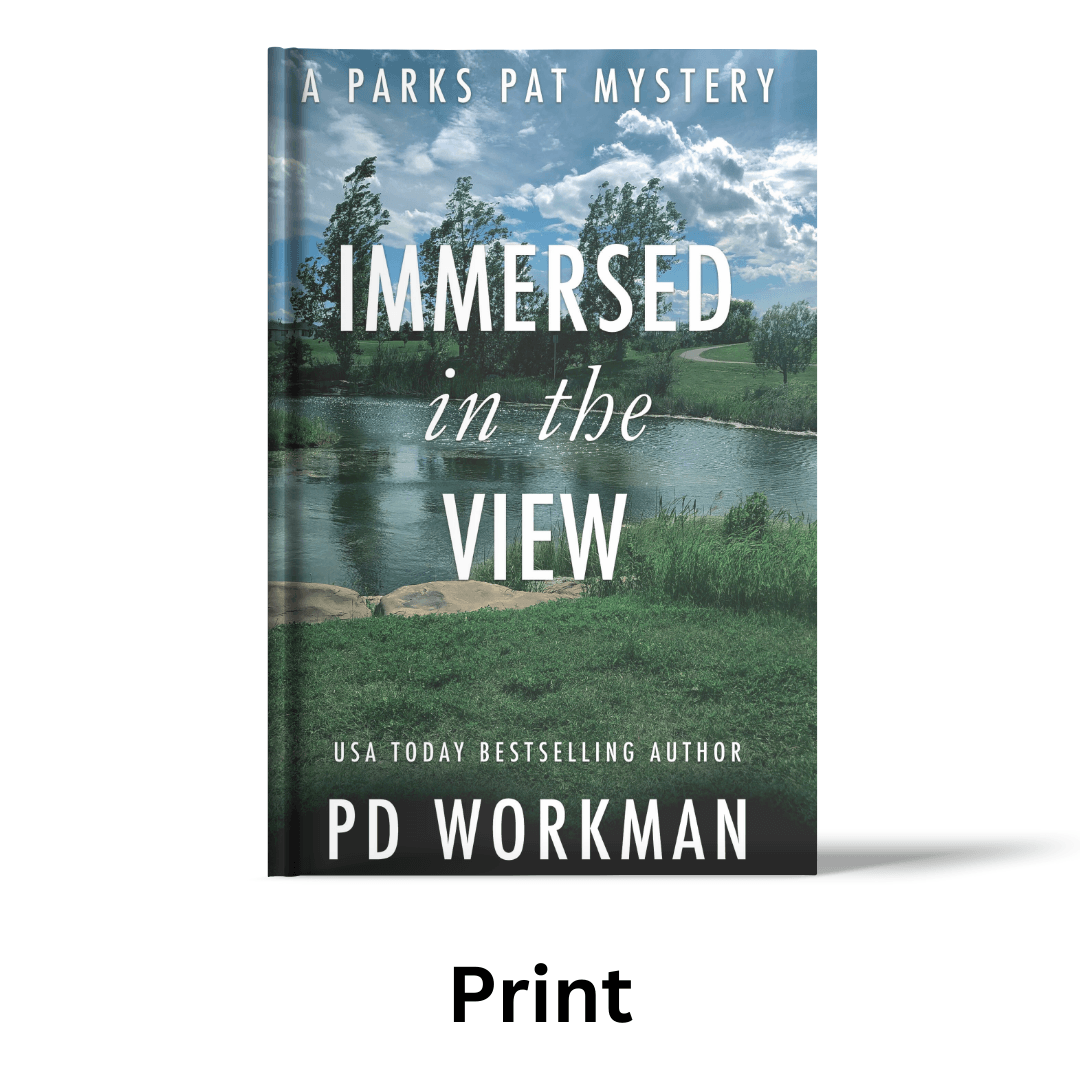Immersed in the View - PP4 paperback
Immersed in the View - PP4 paperback
Couldn't load pickup availability
A Wake Up Call
Detective “Parks” Pat is back. Now an established and accepted member of the homicide squad, she unexpectedly brings a new case to the table when she stumbles across a body as Canada Day dawns. While it was initially assumed to be an accidental drowning, the autopsy results say otherwise.
Margie is soon off and running, but the lack of witnesses has her going in circles. Meanwhile, the brass wants the investigation put to bed before the city is flooded with Calgary Stampede tourists and dignitaries.
⭐️⭐️⭐️⭐️⭐️ Ms. Workman never disappoints! Well developed characters, a tight plot and expert craftsmanship make this one a fast read.
Looking for a police procedural set in picturesque Canada? Let Award-winning and Bestselling Author P.D. Workman take you to her favourite Calgary parks, as Métis detective Margie Patenaude investigates a murder in this fast-paced new series.
These short mysteries are just right for those days when you could use a break from your busy life. Take a walk in a Calgary park with Parks Pat.
Wade into this new mystery today!
Shipping & Returns
Shipping & Returns
All sales are final.
If you have accidentally purchased the same ebook twice, please contact me and we will work it out with a refund or store credit.
Physical products which have not yet been fulfilled can be cancelled, but once they have been shipped to you, they may not be returned.
Share

Collapsible content
Click to Read Sample
Chapter 1
Margie was settled in front of the TV with her teenage daughter Christina as the Calgary Stampede parade began. The Stampede had been canceled the previous year due to COVID so everyone was eager to see its return. The much-shorter parade could only be watched on TV and not attended in person. At least it was still going ahead.
It had been a long time since Margie had seen the rodeo/fair, dubbed “The Greatest Outdoor Show on Earth,” while visiting cousins in Calgary over the summer.
“Do you think we can go to the Stampede?” Christina asked. “There will be lots of stuff to see. Including the Bow River Camp.”
“The Bow River Camp?”
“What used to be the Indian Village. Tipis and dances and other Indigenous culture. You want me to go to stuff like that, don’t you? To be educated about my background?”
Margie pushed her own long, black hair back over her ears, smiling at Christina. “You really don’t need to pull the ‘culture’ card to go to the Stampede.”
Christina had a sip of her coffee. “I didn’t think it could hurt.”
Margie chuckled at this. “Well, we’ll see. I don’t really have anything against it, other than crowds and noise and possible contaminants. And people drinking and getting out of control. The heat and the dust, or the rainstorms…”
Christina shook her head. “Maybe we could take Moushoom down if they have a seniors’ day. He remembers what it used to be like; he can tell us how it compares.”
“I don’t know that I want to be taking an old man down there.” Margie thought about the hazards that she had already mentioned. Her grandfather’s immune system wasn’t as strong as a young man’s. He could be a target for drunks—someone small and frail who couldn’t fight back. He would look strange to them in his brightly colored clothes and buckskins. And the heat was more likely to affect a senior. “Maybe we could take him to one of the pancake breakfasts around here. Or find something that is closer to home. Taking him in his wheelchair on the bus and train…”
“Why can’t we drive?”
“Because there isn’t much parking, and it is expensive. The Stampede gate tickets are expensive enough without having to spend a hundred dollars on parking. Or on hiring a taxi or Uber.”
“Can’t you park for free with your police tag?”
She had a point. But Margie would only use her police tag if she were actually on the job. She wouldn’t use it just to get more affordable or convenient parking. She was scrupulously careful in not taking advantage of anything because she was a police detective. Or playing the race or gender cards, for that matter. She was determined to only get what she had worked hard to earn.
“No, I can’t,” she told Christina flatly. “That’s not the way it works.”
Christina huffed and rolled her eyes. Stella, lying at her feet, opened one eye to examine her to see why she was making such a noise, then decided it was not anything to be concerned about and closed it again. She made a little groan and rolled over so she was right on top of Christina’s foot. Christina wiggled her toes. “Hey! It’s too hot to have a fur rug on my feet. Get off.”
Stella didn’t, and Christina didn’t immediately pull her feet out, but instead reached down to scratch Stella’s ears and then her belly. Stella’s tail thumped loudly on the floor.
“There are the Calgary Police!” Christina exclaimed, as a series of police cars and motorcycles led the parade. “Do they have a float too, or is that it?”
“I think the mounted unit is in it later.”
“It’s a good thing that you’re a homicide detective, so you don’t have to be downtown blocking off streets and keeping drunks away from the parade.”
“You’re right.” Margie was very happy to be right where she was, watching the parade from the comfort of her own home. The convenience more than made up for any pang of regret that they could not see it in person.
They were watching the Native Princess who had been appointed parade marshal when Margie’s phone rang. She looked down at it, hoping that it would not be work. She’d even take a telemarketer. Which was easy, because she didn’t have to answer the phone for a telemarketer. She’d even take a call from Christina’s school saying that she hadn’t handed in some final assignment or they had lost her final exams.
It was work. The name and picture on the display were Detective Siever’s.
She didn’t know Siever well. He was pretty quiet. Good with technical stuff. If she had a computer problem or was trying to figure out how to process a large amount of data, he was the one she would go to. They hadn’t worked very closely on previous files. He seemed to prefer staying in the office over getting out and doing field work. More comfortable with a computer than real people.
Maybe it was just a call to let her know that she had a new login or hadn’t responded to an email he had sent previously.
Margie looked at Christina, who was watching her closely.
“That had better not be work,” Christina warned.
Margie raised her brows in an expression of surrender and swiped the screen to answer the call.
“Detective Patenaude.”
“It’s Siever. I’m heading in your direction. Looks like we might have another case for ‘Parks Pat.’”
Margie thought immediately of Valleyview Park, her last case, just barely put to bed. It couldn’t be another death in Valleyview.
“What’s going on? Where?”
The other possibility that presented itself was Ralph Klein Provincial Park. It had almost been a year since that one, but Siever would still consider it to be “in her direction.” It was only a fifteen-minute drive away. Margie hoped it wasn’t Ralph Klein. She did not like the murky black water in the reservoir beside the education center. The canals and other waterways caused her anxiety enough; that black pool was so ominous and foreboding.
“Elliston Park. You know it?” Siever asked.
“Uh… no, I don’t. I’ve heard of it. I think it is east down Seventeenth Avenue?”
“That’s right. Surprised you haven’t taken your dog there. It’s a nice area.”
Margie had plenty of multi-use pathways close to the house and hadn’t ventured much farther than Valleyview Park. Or north to the winding pathways around Max Bell Center.
“It’s on my list.”
“Well, today you get to see it in person.”
Margie looked over at Christina, sighing. “Do you really need me there?”
“I’d appreciate it. I know everyone is supposed to be off today, but homicides don’t wait for anyone. You’re the closest one, it would disrupt your schedule the least.”
“I’m watching the parade with my daughter.”
“She’s a teenager, isn’t she? She can look after herself until you get back. It will be an hour. Maybe two. You can DVR it and watch it with her later. Fast forward through the boring bits and watch the good stuff over again. Much more entertaining.”
“How long until you’ll be there?”
“I’m about ten minutes out. Probably going by your house about now. I’ll meet you in the east parking lot. You know how to get there?”
“No.” Margie’s stomach tightened. “There is more than one parking lot?”
“Sure.”
And probably only the main one would show up on GPS. By the way Siever said she should meet him in the east parking lot, she assumed that it was not the main entrance.
“Maybe I should use the main parking lot. You can secure things on the east, and I can see if there is anything of note going on in the…”
“The west access.” Siever was silent for a minute. “I don’t think there is going to be anything on that side. The vic’s car will be in the east lot. That’s where we will be collecting evidence.”
“We won’t know if there is anything of note in the west end unless we check. I may as well do that.”
“Do you think you can find your way from the west end to where the body is?”
Margie had an uncomfortable feeling that he knew or guessed more about her lack of sense of direction than she had ever told anyone. Why else would he have asked that?
“How big is this park? Are there are lot of pathways?”
“Not really. They’re just in a loop around the lake. Sort of an outer loop and an inner loop.”
“Okay. And which should I be on?”
He considered for a few seconds. “Fine. Shortest to go around the north side of the lake. If you’re facing the lake from the west parking lot, that’s the left. Doesn’t matter which path you take. The outer loop will be longer, obviously.”
“I can do that.” Margie grabbed a pen and a flyer from the coffee table and scribbled down his instructions. “I’ll be on my way in five minutes.”
He grunted and hung up the phone.
Christina looked at Margie, one eyebrow raised. “First, no Canada Day, and now no parade day?”
“I’m sorry, honey. Like Detective Siever says, you can DVR it and we can watch it together later.”
“I don’t want to watch it later; I want to watch it now. With you. Not a taped version later. We can just watch the news or YouTube for that.”
“I’ll be back as soon as I can be.” Margie knew there was no point in arguing. It wouldn’t get them any closer to overcoming the disappointment that once again, Margie was being taken away from Christina on a day that was supposed to be set apart for the two of them. Christina wasn’t the only one who was upset about her being called in.
“I can’t control when the bodies are found.” Margie divided her hair into sections behind her head and began to braid it. She would have to change out of her casual shorts and t-shirt and into something more appropriate for a homicide detective. And then jump in the car and get to the park as quickly as she could. She didn’t want to keep Siever waiting for too long and it was going to take time to walk to his location.
She hadn’t even asked him how far a walk it would be.
Chapter 2
She was right about the GPS on her phone only giving her one option for a route to Elliston Park. She didn’t even see the second parking lot marked.
Happily, there wasn’t much traffic on Seventeenth Avenue and she was able to get to the park in good time. There were more cars than she expected in the parking lot. Apparently, a lot of people did not care about watching the Stampede parade. It might be sort of a holiday to Calgarians, especially those who normally worked downtown, but there were obviously plenty of people who didn’t watch the coverage.
It was a sunny day, the sky a clear, pale blue. Margie could see people walking dogs, carrying little children on their shoulders, and strolling around the park at a leisurely pace. No one seemed to be aware that there was a dead body somewhere at the other end of the park. It was just a normal day for them.
Getting out of the car, Margie put on a mask and consulted the corner of the flyer that she had torn off and put in her pocket. Facing the lake, take the left-hand pathway.
There were several pathways to the left, and not all of them appeared to loop around the lake. But they might meander other directions first and then turn around. Margie walked slowly, trying to fix the other end of the lake in her mind. She would keep going left, or clockwise, and she would eventually meet up with Siever on the other side.
Margie walked past flower beds vibrant with colors. Keeping left, she discovered some kind of monument and walked closer to take a look. Various cylindrical concrete blocks stood in a half circle, numbers on top of them. There was a grid of months and horseshoes embedded in the pavement in front of them and a starburst shape like a sun or a compass at the top. Margie looked at it, bemused. Public art? A puzzle?
“It’s a sundial,” said a voice behind her.
Margie turned and looked at the woman behind her. Shoulder length brown hair under a baseball cap, somewhat overweight, in a t-shirt and shorts, pushing a stroller with fat wheels seating two toddlers. The children were lolling over, eyes glazed, obviously tired out from walking or playing.
“A sundial?” It didn’t look like any sundial that Margie had ever seen. There was no pointer to cast a shadow on the numbers. The pillars themselves cast shadows, but Margie couldn’t figure out how that would tell her the time.
“You stand on the month,” the mother instructed, pointing to July.
Margie positioned herself on the rectangle.
“Then put your arms over your head like this.” She demonstrated, pressing her palms together, arms extended over her head.
Margie did so.
“Now look at your shadow.”
Margie followed her shadow out to the numbers and found it falling between the eight and the nine. She looked at her phone, thumbing on the screen. Eight-thirty. “It worked!”
The woman laughed. “It does,” she agreed. “Every time.”
“Except if it’s too cloudy or dark to see your shadow,” Margie pointed out.
“Right. Of course.” She gave Margie a broad smile. “Reliable enough for me to know that it was only six o’clock when they were racing those stupid boats.”
Margie looked toward the lake. She couldn’t see any boats from where she stood and didn’t remember seeing any from the parking lot. There were no cars with boats in trailers. Maybe in the other parking lot, where Siever had gone.
“They were racing boats in here?”
Margie would not have thought it large enough for a boat race. It wasn’t just a pond like the one in Valleyview, but it was nothing like Chestermere Lake or the reservoir.
“RC boats.”
“RC?”
“Remote control.” The woman mimed working a controller in her palm. “Little remote control boats. They play with them out on the lake.”
“Oh, I see.” Margie nodded. “Six o’clock does seem a little early to be playing with remote control boats. I suppose whoever it was had the morning off for parade day. But maybe he has to go into the office in the afternoon.”
“Maybe. I still don’t like having the serenity of the morning broken by those whining, whizzing boats. They go so fast. Did you know they can go, like, two-hundred-fifty kilometers per hour?”
Margie tried to picture it. She shook her head. She had been thinking of the remote control cars some of her cousins had had when she was a kid. They didn’t go any faster than a brisk walk. Slower if their batteries were getting low. She had pictured something similar putting along the surface of the lake. But that wouldn’t have irritated the woman so much. It would have been quiet. Little boats going over two-fifty, though… that was a different story. Margie could just imagine them screaming over the water.
“That’s incredible. I had no idea.”
“It’s cool to see people playing with them here. The kids like it. But you would think people could be more considerate and not do it while people are trying to enjoy the peace and quiet of a morning walk.”
“Mommy…” one of the toddlers whined, not sitting up, but still lying back, looking exhausted. “I’m firsty…”
The woman shook her head at Margie. “When we get into the car, I’ll give you a juice box,” she promised.
“I’m firsty too!” the other insisted more loudly.
“I’m sure you are. We’ll be in the car in a minute.”
The woman waved at Margie. “Well, I guess I’d better get on my way.” She looked Margie over, taking in her slacks and blazer. “You… know where you’re going?”
“Just around the lake,” Margie said lightly.
“There’s something going on down the other end. I don’t know what. Saw a bunch of flashing lights and uniforms. Maybe some vandalism or a homeless person causing trouble. They camp out here in the trees sometimes.”
“I’ll watch out,” Margie promised.
“Okay. Have a nice day.”
“You too.”
The woman pushed her stroller back toward the parking lot. Margie reoriented herself to the lake and followed the path that ran along the edge of it.
Ducks and other waterfowl floated serenely on the glassy surface of the lake. The skies were blue with big fluffy white clouds. She could see a few Canada geese floating at the end of the lake as well, one of them clambering up onto the shore to poke through the grass for something tasty. Margie didn’t know as much about wildlife as she should, but she knew enough about Canada geese to give them a wide berth. Being attacked by one of those big birds and their hard beaks was something she would prefer to avoid. They might look like stately, graceful creatures, but cross one, and you’d better be ready to run. It was probably too late in the year for there to be goslings to protect, but Margie was not going to find out.
The single pathway split into two, and Margie hesitated over which to follow. Siever had said that there was an inner loop and an outer loop. She could stay on the inner loop, where she could keep the lake in sight. It would be a shorter distance for her to walk. But if the woman was right and there were sometimes homeless people camped in the trees, then maybe she should take the path that led into the grove of trees. There might be witnesses to interview. Evidence that someone had discarded in the trees in the hopes that the police would never see it.
It would take longer, which would probably irritate Siever. But it would be more efficient and save time in the overall investigation.
Margie unlocked the screen on her phone and tapped Siever’s recent call record. She walked into the trees as she waited for him to answer.
“Did you get lost?” Siever asked dryly.
“No, your directions were good. I’m on my way around to you. I just thought I’d let you know that I’m taking the longer route, through the trees. I could see a good deal of the shore, and I don’t see anything suspicious by the lake. But something could easily be hidden in the trees, and a woman I just passed said that sometimes the homeless camp out here. So I’m going to take a quick walk through to see if there is anything that we need to take a closer look at.”
Siever was silent for a moment, considering this. She waited for him to tease her that he thought she had gotten lost and was just looking for an excuse for her lateness. Cruz or Jones would have. But Siever was quieter, a bit shy or awkward. He didn’t press it.
“I suppose if you think that’s the best course,” he allowed. “You’re the one with experience in parks.”
She didn’t have that much experience. She certainly wasn’t a tracker of any kind. She hadn’t inherited that gene through her Cree or European explorer ancestors. But Siever had agreed to her chosen course.
“Thanks. I’ll see you in a few minutes, then.”
Award-winning Canadian author P.D. Workman has written over a hundred addictive page-turners featuring diverse and divergent sleuths, high-stakes investigations, and stories that linger long after the last page.
Her books dive deep into characters’ minds while exploring timely social issues through fast-paced, emotionally charged plots. Readers praise her work for its powerful emotional truth combined with unputdownable suspense.




